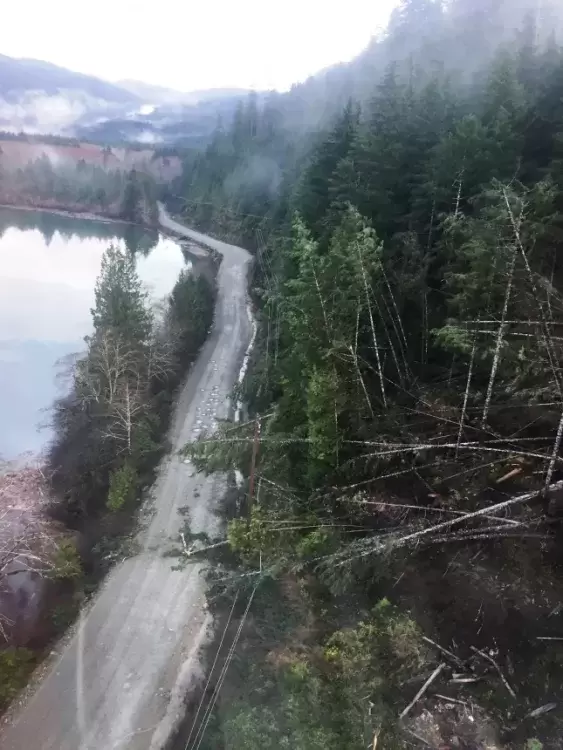The windstorm that swept through the west coast of Vancouver Island on Tuesday last week (Nov. 17) left more than 121,000 British Columbians without power.
Ditidaht First Nation was among the affected communities, losing its power for around 38 hours, said elected chief Brian Tate.
“It’s a natural occurrence every year,” he said unfazed.
There are only four or five homes in the remote community by Nitinaht Lake without a generator, as the nearest town of Port Alberni is over an hour away.
Last year alone, residents within Ditidaht First Nation experienced three or four power outages, which Tate chalks up to part of the lifestyle.
“But sometimes it’s an unforeseen incident,” he said.
Taking some of the community’s nearly 200 residents by surprise, the recent storm left many without enough fuel to supply their generators. In response, the nation’s local gas station came out of hibernation and opened for a few hours to allow citizens to stock up.
As the frequency of storms rise, the number of customer outages during a storm has increased from 323,000 in 2014 to an average of more than one million customers over the past three years, according to a recent BC Hydro report.
Of the few buildings that do not have generators within Ditidaht First Nation is their band office.
Tate said the ongoing pandemic has made this matter more pressing and that council is hoping to supply band businesses with generators as part of their emergency strategy planning.
“[COVID-19] makes you more aware of what’s needed in the community,” he said.
When the power goes out, Ditidaht members are in contact with BC Hydro to inform them where trees have crossed over the power line leading into the community.
Trees or branches hitting power lines during storms cause over half of all power outages in B.C. To minimize their impact, BC Hydro invests in year-round vegetation management by pruning and removing flawed trees and vegetation that may fall and cause power outages in a storm, said BC Hydro spokesperson, Susie Reider.
The restoration of power is prioritized based on outages that pose the greatest risk to public safety, such as downed lines, she said.
“For restoration in remote communities, BC Hydro takes much the same approach as elsewhere in the province, and we plan for outages the same way as we do in other communities year-round,” said Reider. “Depending on the location, it may take longer to reach a remote community if weather conditions prevent access [or] safe travel. BC Hydro does have access to helicopters to make repairs to damaged equipment, depending on location and type [or] severity of the damage.”
By supplying elders with firewood and encouraging residents to maintain their fuel supplies, Ditidaht First Nation is preparing for more imminent power outages in the few ways they can.
“As storms get worse and more frequent, it is critical that customers prepare for outages during storm season by having an emergency preparedness kit on hand with 72 hours of supplies such as water, non-perishable goods, batteries and a flashlight, as well as a contingency plan for their household,” said Reider.







